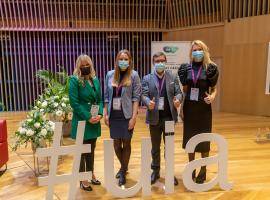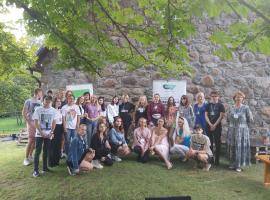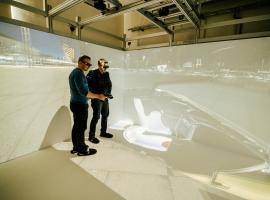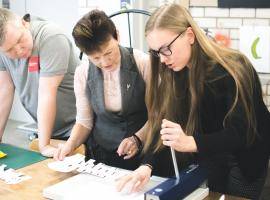The City of Ventspils approves a new FDI strategy within the context of the NextGen Microcities project

The ambition of NextGen Microcities project is to develop a blueprint model for other European microcities, help them to transform their local economies from post-industrial to digital ones, and in doing so, create new prosperity and new jobs.
One of the planned actions of the project is to develop and test a Foreign Direct Investment (FDI) strategy for the two leading cities of the project: Ventspils and Valmiera.
Ventspils just produced a strategy paper highlighting its new Foreign Direct Investment strategy, and this article presents it in the context of FDIs inflows in Europe and their impact on cities.
What is Foreign Direct Investment?
A foreign direct investment (FDI) is an investment made by a firm or individual in one country into business interests located in another country. Generally, FDI takes place when an investor establishes foreign business operations or acquires foreign business assets in an international company. So, it is not about trade; it is about acquiring assets in economic organizations. The key feature of foreign direct investment is that it establishes either effective control of or at least substantial influence over the decision-making of a foreign business. Foreign direct investment frequently involves more than just a capital investment. It may include provisions of management or technology or knowledge as well, which bring with them some positive spillovers as they contribute to human capital development and R&D in the invested company and its supply chain. FDI, therefore, has a direct impact on jobs and economic growth, as it brings economic surplus and additional value creation assets to the territory, and this is why it is so important for cities to become attractors for FDIs.
First, the location decisions of foreign firms are influenced by their underlying motives for investing abroad:
Market-seeking FDI
Firms may wish to pursue business opportunities in local or nearby markets and will choose the location that offers the best access to the largest market at the lowest cost of trade and transportation.
Efficiency-seeking FDI
Firms may wish to improve their productivity by diversifying production to take advantage of different factor endowments and other FDI attraction factors such as investor incentives, economic policies, and market structures.
Resource-seeking FDI
Firms may locate in foreign markets to secure access to critical resources such as human capital, technology, and natural resources.
Strategic FDI
Firms may be motivated by strategic considerations where the firm seeks to sustain or advance its long-term global competitiveness.
In all four cases, firms wanting to invest in other counties or regions seek the presence of strategic access or assets that can leverage their investments and guarantee above-average growth prospects. Therefore, cities that are not able to offer infrastructures, skilled human capital, natural or business assets etc. struggle to attract FDIs.
FDIs in Europe and their impact on cities
Europe indeed is a powerful attractor of FDI in the global arena, receiving inflows of capital investments from many countries in the world.
According to the European Commission, FDI totalled €7.2 billion during 2018, and it accounts for 45% of the European Union (EU) Gross Domestic Product (GDP).
A recent EY survey reveals that 6,412 FDI projects were announced in Europe in 2019, a 0.9% uptick from 2018. The investment was particularly substantial in France and Spain. However, global trade tensions, Brexit uncertainty, and subdued economic growth caused investment across all of Europe to increase by only a modest amount. Measured by the number of announced projects alone, 2019 was the second-strongest year for FDI ever, behind 2017. But then COVID-19 interrupted project realization, and the outlook for 2020 now looks uncertain.
FDI recovery rates are still challenging to predict because the investment is also contingent on the scale of recovery in the regions from which FDI into Europe emanates, beginning with Europe itself. Indeed, a protracted European recession would significantly impact FDI, given that 52% of European investment came from European companies between 2015 and 2019. That said, some countries are especially reliant on the United States (US), such as Ireland, where 40% of the private sector depends on US companies.
Overall, foreign firms (both non-European and European owned) account for three percent of the total number of firms, but 18 percent of total employment and thus have a disproportionately large footprint on the European economy.
Europe’s two leading FDI sectors by the number of projects show the scale and breadth of Europe’s ongoing digital transformation. The digital and business services sectors attracted most FDI in 2019, collectively accounting for 31% of new projects and 24% of new jobs created.
Concerning manufacturing, the transportation industry (including automotive and aeronautics), chemicals and plastics, machinery and industrial equipment, and agri-food sectors will all be hit very hard by the COVID-19 crisis. By contrast, the pharmaceutical and medical equipment sectors appear resilient, possibly because of the same crisis.
But it is not just about the overall volume of investments or number of projects; it is mainly about how those are distributed between European countries and within them. Investors seek opportunities in concentrations of people, brainpower, markets, and excellent infrastructures (physical, social, legal). Also, the availability of the brightest and best talent has become a strategic criterion for FDI success. Europe does not have an even distribution of wealth, nor all countries grow at the same rate. A few dominate the list as recipients of FDI: UK, France, Germany, Spain, and the Netherlands. In those countries, the economies of big cities grow twice as fast as those of the country’s overall. Big cities offer a more favourable environment for FDI than small or micro ones.
The same 10-15 large cities have been appearing year after year on top of the list of FDI recipients in Europe.
At the same time, in the last few years, more and more small and micro cities are appearing on the list of European cities that promise reasonable rates of economic development in the future. The power of digital transformation, and digitally transformed economies, may offer good chances to such cities, as a digitally connected world and a dematerialized economy may favour those places that can provide a better quality of lifestyle. The guess is that in a post-COVID-19 world, this trend will increase, as statistics appear to demonstrate that COVID-19 was, first of all, an effect of urban density.
Here lies the importance of the NextGen project, supporting two micro cities in Latvia to leapfrog into the digital transformation era, and make them attractive to both digital talents and FDI. A key part of the project is the development of an FDI strategy, which cannot be a standalone exercise but must be connected to existing and future assets of the cities, including the development of an ICT skilled pool talent.
A new FDI strategy for Ventspils
In February 2020, a Nordic FDI attraction to Ventspils in the field of ICT strategy paper was released. The paper “invites foreign investors from Nordic countries to become an integral part of its ecosystem and contribute to cross-functional community-building relevant to the development of ICT sector in Ventspils based on its existing and future infrastructure.”
The strategy is the result of a focus group with key stakeholders from the City’s ICT ecosystem, including, of course, the municipality and a benchmark survey to 190 businesses related to ICT in the UK, Sweden, Russia, and of course, Latvia.
In 2012-2013, Ventspils designed its ICT Sector Development Strategy & Action Plan for 2014-2020, which envisioned Ventspils “to be the best place for education, work, and living in ICT.” Simultaneously, in 2017, Ventspils City was accepted as one of 15 European cities taking part in the European Commission initiative Digital Cities Challenge, which in cooperation with experts from the Commission and peer cities, aimed to strategize better the existing activities laid out in the 2014-2020 strategy. As the initiative kicked off, Ventspils was identified as a digitally transforming city.
Ventspils selected the development of a smart, digital infrastructure as its strategic sector to be addressed: the expected output in 5 to 10 years is to create an intelligent industry region of choice for local, national, and international human resources and financial investors, and to attract new workforce. Coherently, the City has invested in high-speed internet, optical cables, free office space and co-working for ICT businesses, and an upcoming Science and Innovation Centre as a solid base for ICT community building.
The NextGen Microcities project will add some new features to this infrastructure: maker spaces to test out digital technologies for manufacturing, an ambitious EdTech program for pupils and a professional development ICT one for the re-skilling and up-skilling of the existing workforce, the development of career guidance and an online portal to attract ICT talent from abroad, and several other innovations designed to make the ICT ecosystem more robust and more vibrant. On top, 2021 marks the new programming period of European funds, which may also provide new opportunities for ICT enterprises, for many of the upcoming planning period’s priority fields are related to digital transformation.
On the opposite spectrum, there are some threats to the development of the ecosystem as envisioned: a complex, sometimes unpredictable national tax system, a relatively tight restriction in terms of applying for residency, depopulation, and a lack of well-defined local policies for incentivizing start-ups to locate in the City. Those are all dimensions that will have to be tackled in the near future.
The above-mentioned business survey helped to identify six promising fields of ICT application that can become attractors of FDI:
Public services
The most vivid example is the Ventspils ICT pilot-project program, which envisions to develop, test, and/or implement ICT solutions in Ventspils City, the City thus serving as a testbed. By taking part in the program, businesses may receive co-funding.
Space-tech
In the mid-2000s, Ventspils City stepped into initiatives related to space-tech development, even creating a space-tech cluster. Also, the key stakeholder, Ventspils University of Applied Sciences, hosts Ventspils International Radio Astronomy Centre (VSRC) which has received international attention.
EdTech
The City is implementing various piloting solutions in the EdTech field through the NextGen Microcities project.
Virtual reality
Although not yet fully explored in Ventspils, within the scope of the NextGen project, a VR pilot-class is to be launched in Ventspils Vocational School.
Hardware
As several high-level export companies with ties in the Nordic region have already been operating in Ventspils, particularly in the branch of electronic components and LCDs, the industry has proven its ability to develop in Ventspils.
Gaming
Several incentives have been deployed in recent years, including Ventspils becoming an active participant of the Latvian Gaming Association. In 2019, the industry was nailed by an innovative, globally recognized gaming keyboard developer emerging in Ventspils.
Considering all of the above, Ventspils City is in an excellent position to become a digitally transforming city: it offers excellent infrastructure, it is non-saturated in terms of access to funding, and it envisions to serve as a testbed with reasonable proximity to other major IT hubs. The NextGen project, and the upcoming marketing plan, which will promote Ventspils as an FDI valid destination, will help to build the community and will attract new businesses, through which the City may also fill the gaps of an insufficient talent base.



































